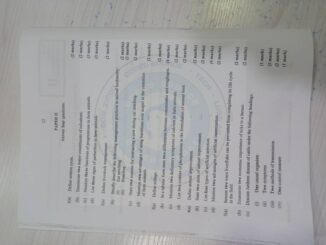
NECO COMMERCE QUESTION;-ExamgrandComNg !!!!!


=======================================
NECO COMMERCE OBJ;-ExamgrandComNg
01-10>ABDDCBBACE
11-20>BDABCBDDBB
21-30>BDDDCDECCD
31-40>DBAEBAEABB
41-50>DCEDDCEBDA
51-60>EEDBEDAAAB
Completed by Examgrand.Com.Ng
=======================================
NECO COMMERCE ANSWERS;-ExamgrandComNg !!!!!
NUMBER 1
PICK ANY FIVE (5)
(1)
(i)Awareness:
One of the important roles of advertising is to create awareness of the product or services such as brand name and price. The awareness of the product or services can be created through highlighting the unique features of the brand. Nowadays, due to intense competition it is not just enough to create awareness, but top of mind awareness is needed.
(ii) Information:
Advertising helps to inform the target audience about the product. Providing information is closely related to creating awareness of the product. Potential customers must know about a product, such as product features and uses.Product information is very much required, especially when the product is introduced in the market, or when product modification is undertaken. Proper product information can help the consumers in their purchase decision.
(iii)Persuasion:
When business firms offer similar products, the firm must not only inform the customers about the product’s availability, but also persuade them to buy it. Through persuasive messages, the marketers try to provide reasons regarding the superiority of their products as compared to others available in the market. Persuasion can be undertaken through creative advertising messages, product demonstration at trade fairs, offering free gifts, premium offers and organizing contests.
(iv) Reminder:
If target customers already have a positive attitude towards a firm’s product or service, then a reminder objective may be necessary. The reminder objective is necessary because the satisfied customers can be targets for competitors’ appeals. Well-established brands need to remind the customers about their presence in the market. For instance, ‘Raymond – the complete man’ campaign is designed to remind the customers.
(v) Expansion of Markets:
Successful ads results in expansion of the markets. A marketer may intend to expand markets from the local level to the regional level, from the regional level to the national level, and from the national level to the international level. For this purpose, the marketer may undertake various techniques of promotion..
=======================================
(2a)
Pick any two (2)
1. Employers hire and manage employees, *while* employees work for an employer.
2. Employers set the terms of employment, *while* employees must accept them.
3. Employers are responsible for paying wages, *while* employees are responsible for performing their duties.
4. Employers have the right to terminate an employee, *while* employees have the right to resign.
(2b)
Pick any four (4)
1. Provide Labor: Employees are expected to provide labor to the employer in exchange for a wage or salary. This labor can be physical or mental work, depending on the job.
2. Follow Instructions: Employees are expected to follow instructions given by their employer. This includes following company policies and procedures, as well as any specific instructions given to them for their job.
3. Show Up On Time: Employees are expected to show up to work on time and be present for their entire shift as scheduled.
4. Be Productive: Employees are expected to be productive during their shifts and contribute to the overall success of the company.
5. Respect the Workplace: Employees must respect the workplace by following rules and regulations, refraining from inappropriate behavior, and treating coworkers with respect.
6. Adhere to Safety Standards: Employees must adhere to safety standards set by the employer in order to ensure a safe working environment. This includes following safety protocols, using protective equipment, and reporting any safety concerns to the employer.
=======================================
(3a) An insurance is a legal agreement between an insurer (insurance company) and an insured (individual), in which an insured receives financial protection from an insurer for the losses he may suffer under specific circumstances.
(3b) PICK ANY FOUR
(i) Principle of Utmost Good Faith
This is a primary principle of insurance. According to this principle, you have to disclose all the information that is related to the risk, to the insurance company truthfully.
You must not hide any facts that can have an effect on the policy from the insurer. If some fact is disclosed later on, then your policy can be cancelled. On the other hand, the insurer must also disclose all the features of a life insurance policy.
(ii)Principle of Insurable Interest
According to this principle, you must have an insurable interest in the life that is insured. That is, you will suffer financially if the insured dies. You cannot buy a life insurance policy for a person on whom you have no insurable interest.
(iii)Principle of Proximate Cause
While calculating the claim for a loss, the proximate cause, i.e., the cause which is the closest and the main reason for a loss should be considered.
Though it is a vital factor in all types of insurance, this principle is not used in Life insurance.
(iv) Principle of Subrogation
This principle comes into play when a loss has occurred due to some other person/party and not the insured. In such a case, the insurance company has a legal right to reach that party for recovery.
(iv) Principle of Indemnity
The principle of indemnity states that the insurance will only cover you for the loss that has happened. The insurer will thoroughly inspect and calculate the losses. The main motive of this principle is to put you in the same position financially as you were before the loss. This principle, however, does not apply to life insurance and critical health policies.
(v) Principle of Indemnity
The principle of indemnity states that the insurance will only cover you for the loss that has happened. The insurer will thoroughly inspect and calculate the losses. The main motive of this principle is to put you in the same position financially as you were before the loss. This principle, however, does not apply to life insurance and critical health policies.
(vi) Principle of Contribution
According to the principle of contribution, if you have taken insurance from more than one insurer, both insurers will share the loss in the proportion of their respective coverage.
If one insurance company has paid in full, it has the right to approach other insurance companies to receive a proportionate amount.
(vii) Principle of Loss Minimisation
You must take all the necessary steps to limit the loss when it happens. You must take all the necessary precautions to prevent the loss even after purchasing the insurance. This is the principle of loss minimization.
=======================================
NUMBER (4a)
1. Personalized Service: Small businesses are often able to provide more personalized and attentive service to their customers than larger businesses. This can create a loyal customer base that values the individual attention they receive.
2. Niche Markets: Small businesses can often find success by catering to niche markets that larger businesses may not target. By focusing on a specific product or service, small businesses can differentiate themselves from the competition and build a loyal customer base.
3. Flexibility: Small businesses are often more flexible and able to adapt quickly to changes in the market. They can make decisions and implement changes more quickly than larger businesses, which can be bogged down by bureaucracy and red tape.
4. Innovation: Small businesses are often more innovative than larger businesses, as they have to find creative ways to compete with limited resources. By embracing new technologies and ideas, small businesses can stay ahead of the curve and find success in the market.
(4B)
1. Size and Scope: The most obvious difference between small and large scale retail outlets is their size and scope. Small retail outlets are typically independently owned and operated, with a limited selection of products and services. Large scale retail outlets, on the other hand, are often part of a chain or franchise, with a much larger selection of products and services.
2. Customer Service: Small retail outlets often pride themselves on providing personalized and attentive customer service. They may have a more intimate knowledge of their customers’ needs and preferences, and may be able to provide more individual attention. Large scale retail outlets, on the other hand, may focus more on efficiency and speed, with less emphasis on personalized service.
(4C)
Small Scale Retail Outlets:
1. Local grocery stores
2. Independent bookstores
3. Family-owned restaurants
4. Boutique clothing stores
Large Scale Retail Outlets:
1. Walmart
2. Target
3. Home Depot
4. Best Buy
=======================================
NUMBER (5a)
The term “second tier securities market” is not commonly used in the United States. However, it may refer to a market where securities that are not listed on a major exchange, such as the New York Stock Exchange or Nasdaq, are traded. This can include regional exchanges or alternative trading systems that provide a platform for trading securities that are not listed on major exchanges.
(5B)
1. Financial Requirements: Companies must meet certain financial requirements, such as a minimum amount of shareholder equity or a minimum market capitalization, in order to be listed on an exchange.
2. Corporate Governance: Companies must have a board of directors and adhere to certain corporate governance standards in order to be listed on an exchange.
3. Reporting Requirements: Companies must file regular reports with the Securities and Exchange Commission (SEC) and meet other disclosure requirements in order to be listed on an exchange.
4. Trading Requirements: Companies must meet certain trading requirements, such as a minimum number of shareholders or a minimum trading volume, in order to be listed on an exchange.
(5C)
1. Reverse Merger: A company can gain admission to a securities exchange by merging with a publicly traded company.
2. Spin-Off: A company can gain admission to a securities exchange by spinning off a subsidiary into a separate publicly traded company.
3. Acquisition: A company can gain admission to a securities exchange by acquiring a publicly traded company.
4. Up-Listing: A company can gain admission to a larger securities exchange by moving from a smaller exchange to a larger exchange
=======================================
(6a) Economic grouping is an organization that encourages economic cooperation among its member countries.
(6b)
PICK ANY EIGHT
(i) To encourage increased trade among member countries
(ii) To promote a wild range of industrial development
(iii) To promote a better allocation of resources
(iv) To promote a better mobility of factors of production
(v) To ensure future customs union
(vi) To facilitate infrastructural development among member countries
(vii) To promote economies of large scale production
(viii) To remove all forms of tariff and quotas among member states.
(ix) To harmonize a bargaining power/devices to a better prices of their agricultural products.
(x) To create a wild market for member countries
=======================================
(7a)
(PICK ANY FOUR)
(i) Commercial Banks: These institutions play a significant role in the money market by borrowing and lending money to individuals, businesses, and other institutions. They also provide various financial services such as checking accounts, savings accounts, and loans.
(ii) Central Banks: These institutions are responsible for controlling and regulating the money supply and setting interest rates in their respective countries. They also guide the economic and fiscal policies of their country.
(iii) Mutual Funds: These institutions provide investors with the option to diversify their investments by investing in a variety of different securities, such as stocks, bonds, and derivatives.
(iv) Investment Banks: These institutions help companies access capital markets by issuing new securities and providing a range of other services such as underwriting, merger advice, and asset management.
(v) Hedge Funds: These institutions use a variety of complex investment strategies to generate returns for investors.
(vi) Insurance Companies: These institutions manage the risks of individuals and businesses by providing insurance products such as life insurance, health insurance, and property insurance.
(7b)
(PICK ANY TWO)
(i) Soft commodities are often perishable and are subject to seasonal demand swings, while hard commodities are generally non-perishable and less sensitive to seasonal demand variation.
(ii) Soft commodities are usually consumed before reaching the market, while hard commodities are consumed further down the production chain.
(iii) Soft commodities are mostly traded on futures exchanges, while hard commodities are mainly traded in over-the-counter (OTC) markets.
(iv) Soft commodities tend to have more volatile prices than hard commodities, since they are affected by factors such as weather patterns and crop yields.
(v) Soft commodities typically require more intensive management by producers, while hard commodities require less intensive management.
(vi) Soft commodities are more easily transported than hard commodities, which tend to be bulky and heavy.
========================================
(8a)
Customs and Excise Authority is an agency responsible for the collection of taxes on imported and exported goods. This authority is responsible for ensuring compliance with government regulations related to the import and export of goods. They also enforce laws related to the movement of goods across international borders.
(8b)
( PICK ANY 4 )
(i) Collecting Taxes: The authority collects taxes on imported goods and ensures that the correct taxes are paid by importers. They also collect taxes on exported goods.
(ii) Enforcing Regulations: The authority enforces regulations related to imports and exports. This includes ensuring that goods meet the required standards and are safe for use.
(iii) Preventing Smuggling: Customs and Excise Authority works to prevent smuggling by inspecting goods at ports of entry and exit. They also work to identify and apprehend smugglers.
(iv) Protecting the Economy: Customs and Excise Authority helps protect the economy by preventing the importation of goods that could harm local industries. They also help to prevent the export of goods that are restricted or banned.
(v) Facilitating Trade: Customs and Excise Authority works to facilitate trade by ensuring that goods move smoothly across borders. They also help to reduce delays and facilitate the movement of goods.
=======================================
(9)
(i) Bond:- is a debt instrument that is issued by a borrower to an investor. When an investor purchases a bond, they are essentially lending money to the issuer (the borrower) for a fixed period of time, in exchange for regular interest payments and the return of the principal at the end of the term. Bonds are typically issued by corporations, municipalities, and governments to raise capital for various purposes, such as financing new projects, funding operations, or paying off existing debt.
(ii) Carrier :is a company that provides transportation services to move goods or people from one place to another. Carriers can be involved in various modes of transportation, such as air, sea, rail, or road transport. They are responsible for the safe and timely delivery of goods or passengers to their destination. Carriers can be divided into two main categories: passenger carriers and freight carriers.
(iii) Debenture: A debenture is a type of debt instrument that is issued by a company to raise capital from investors. When an investor purchases a debenture, they are essentially lending money to the company for a fixed period of time, in exchange for regular interest payments and the return of the principal at the end of the term. Debentures are typically unsecured, meaning that they are not backed by collateral, and are considered a higher-risk investment than secured debt instruments such as bonds.
(iv) Communication:-is the process of exchanging information, ideas, or thoughts between two or more people. Communication can take many forms, such as verbal, nonverbal, written, or visual, and can occur through various channels, such as face-to-face conversations, phone calls, emails, text messages, or social media. Effective communication is essential in all aspects of life, including personal relationships, business, education, and healthcare.
(v) Transportation: is the movement of people, goods, or services from one place to another. Transportation can take many forms, such as air, sea, rail, or road transport, and can be used for various purposes, such as commuting, trade, tourism, or emergency response. Transportation is an essential component of modern society, as it enables people to access goods and services, connect with others, and participate in economic activities.
=======================================
CLICK HERE TO JOIN OUR TELEGRAM CHANNEL FOR ALL 2023 EXAM ANSWERS FOR FREE
JOIN OUR TELEGRAM CHANNEL TO KNOW WHEN ANSWERS ARE POSTED!!!!
=============================





Be the first to comment